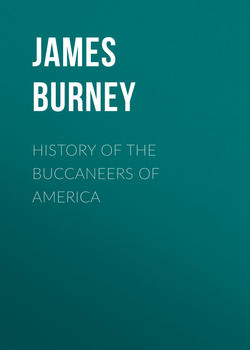History of the Buccaneers of America

Реклама. ООО «ЛитРес», ИНН: 7719571260.
Оглавление
James Burney. History of the Buccaneers of America
CHAPTER I
CHAPTER II
CHAPTER III
CHAPTER IV
CHAPTER V
CHAPTER VI
CHAPTER VII
CHAPTER VIII
CHAPTER IX
CHAPTER X
CHAPTER XI
CHAPTER XII
CHAPTER XIII
CHAPTER XIV
CHAPTER XV
CHAPTER XVI
CHAPTER XVII
CHAPTER XVIII
CHAPTER XIX
CHAPTER XX
CHAPTER XXI
CHAPTER XXII
CHAPTER XXIII
CHAPTER XXIV
CHAPTER XXV
CHAPTER XXVI
CHAPTER XXVII
Отрывок из книги
1492-3. Hayti, or Hispaniola, the first Settlement of the Spaniards in America. The first settlement formed by the Castilians in their newly discovered world, was on the Island by the native inhabitants named Hayti; but to which the Spaniards gave the name of Española or Hispaniola. And in process of time it came to pass, that this same Island became the great place of resort, and nursery, of the European adventurers, who have been so conspicuous under the denomination of the Buccaneers of America.
The native inhabitants found in Hayti, have been described a people of gentle, compassionate dispositions, of too frail a constitution, both of body and mind, either to resist oppression, or to support themselves under its weight; and to the indolence, luxury, and avarice of the discoverers, their freedom and happiness in the first instance, and finally their existence, fell a sacrifice.
.....
Ovando, however, was intent on procuring the mines to be worked as heretofore, but proceeded with caution. In his dispatches to the Council of the Indies, he represented in strong colours the natural levity and inconstancy of the Indians, and their idle and disorderly manner of living; on which account, he said, it would be for their improvement and benefit to find them occupation in moderate labour; that there would be no injustice in so doing, as they would receive wages for their work, and they would thereby be enabled to pay the tribute, which otherwise, from their habitual idleness, many would not be able to satisfy. He added moreover, that the Indians, being left entirely their own masters, kept at a distance from the Spanish habitations, which rendered it impossible to instruct them in the principles of Christianity.
This reasoning, and the proposal to furnish the natives with employment, were approved by the Council of the Indies; and the Court, from the opinion entertained of the justice and moderation of Ovando, acquiesced so far as to trust making the experiment to his discretion. In reply to his representations, he received instructions recommending, 'That if it was necessary to oblige the Indians to work, it should be done in the most gentle and moderate manner; that the Caciques should be invited to send their people in regular turns; and that the employers should treat them well, and pay them wages, according to the quality of the person and nature of the labour; that care should be taken for their regular attendance at religious service and instruction; and that it should be remembered they were a free people, to be governed with mildness, and on no account to be treated as slaves.'
.....